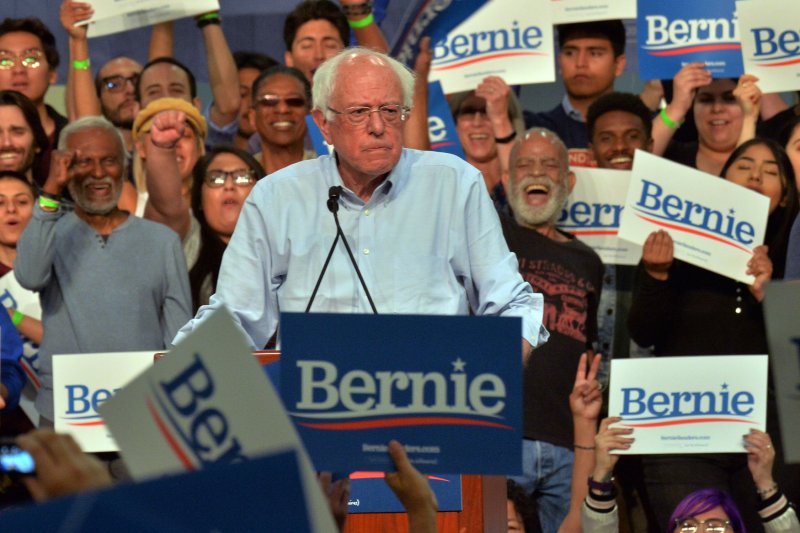Democratic presidential candidate Bernie Sanders espouses "socialist" ideas. Photo by Jim Ruymen/UPI |
License Photo
For at least a century and a half, "-isms" have been the enemy of Western democracies. That continues today but, sadly, in a far different and dangerous way. Republicans and Democrats are weaponizing two "isms" -- "socialism" and "capitalism" -- and sending them into political battle. The nation as a whole will be the loser.
At the end of the 19th century, "anarchism" and "nihilism" were the villains linked to terror that killed presidents, prime ministers, kings and in 1914 an archduke. "Anarchism" was blamed for the letter bombings of 1919 and 1920 in America that killed only one person. Yet, Americans panicked. Promiscuous use of the Espionage Act of 1917 led to detention without warrant or charge of thousands of Americans. Large numbers were deported without due process over that "-ism."
Lurking were what would become politically explosive 20th century "-isms": "socialism," "fascism," and after 1917, "communism," as Russia became the Union of Soviet Socialist Republics. Internecine warfare was inevitable within and between communism and fascism. The politburo was not immune. With Vladimir Lenin's death, Joseph Stalin concluded that the permanent revolution so passionately demanded by Leon Trotsky abroad was anathema to securing national survival of the USSR at home. Stalin won, ultimately rewarding Trotsky, living in Mexican exile, with an assassin's ice pick to the brain.
Fascism and communism were two sides of the same ideological coin, both believing that a powerful central government was essential to sustaining the state. The means, however, were profoundly different. These ideological differences would lead to deadly competition.
The first was when the two "-isms" found themselves on opposite sides in the Spanish Civil War of 1936. Berlin underwrote Franco and his "nationalists" in their coup, while Moscow backed the Republicans or "loyalists" defending the government. The second, of course, was June 22, 1941, when Hitler invaded Russia.
During the interwar period, Americans were ambivalent over communism and fascism. Franklin D. Roosevelt recognized the Soviet Union in 1933 and some Americans became convinced that Russia was a "worker's paradise." Others, like Charles Lindbergh, were mesmerized by Hitler and Nazi Germany. 1939 and then Pearl Harbor brought America to its senses.
After World War II was won, intractable divergences between Allied and Soviet interests could never be resolved. As the Iron Curtain descended on Eastern Europe and in 1949 Mao's communism prevailed in the civil war over Chiang Kai Shek's nationalists in China, an older "-ism" became the declared enemy. Communism threatened the West. Today, China is a capitalist economy under the tight control of the Communist Party.
Ironically, in America, the latest domestic political "-ism" enemies are the once feared label of "socialism" and, surprisingly, "capitalism." Socialism was traditionally defined to mean government control of the means of production as the most efficient and fairest form of governance.
Capitalism meant free and open markets in which individuals and the private sector were the most efficient and fairest mechanisms for economic progress -- once the bedrock of America's democracy. Neither of those definitions apply to the current American political debate. As "gay" has taken on a different and to many a positive meaning, "socialism" and "capitalism" have become epithets Republicans and Democrats are hurling at each other.
For more extreme Democrats, "capitalism" is a vile term meaning a system in which the rich get richer and the poor pay the freight. Not only is big business a part of this evil, Wall Street hedge funds and investment bankers are perverting the system in their favor, exacerbating income inequality.
To extreme Republicans, "socialism" is radical government and the deus ex machina for controlling society and obliterating the role of the private sector. In this nightmarish view, healthcare will be nationalized under a single government payer and the Green New Deal will bankrupt the country in trying to reverse the effects of climate change.
Both extreme views are dead wrong. Demonizing socialism and capitalism may appeal to respective bases. However, that usage does huge damage to the political dialogue as the debate is over equally false narratives.
The best solution is to end the use of either "-ism" in these grotesque redefinitions that demean any serious discussion taking the discourse to the lowest possible level. Capitalism in a politically acceptable form should mean "free and open markets under the rule of law." Socialism should mean the degree to which government can or should replace the private sector in directing the economy and national prosperity.
Of course, redefinition needs a rational and objective basis for debate. In today's destructive politics, that is impossible. Republicans declare Democrats as socialists to frighten the public. And by claiming capitalism is a dirty word, Democrats discredit Republicans.
Ah, for the good old days if they ever existed, especially when a gay old time could be welcomed by all sides.
Harlan Ullman is UPI's Arnaud de Borchgrave Distinguished Columnist. His latest book is "Anatomy of Failure: Why America Has Lost Every War It Starts." Follow him @harlankullman.















